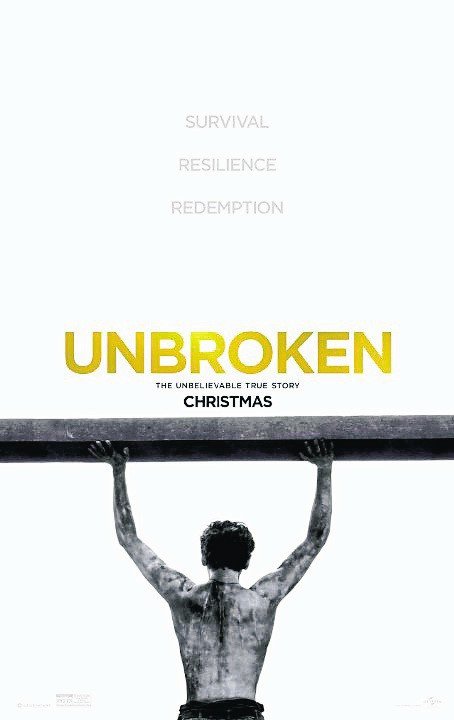Unbroken
Many readers will be aware of the book War and grace by Don Stephens (EP Books), a collection of short biographies of Christians from the two World Wars.
Its first story concerns an American of Italian extraction called Louis Zamperini. The new edition of the book reveals that he died on 2 July 2014 and mentions the 2010 biography Unbroken by Laura Hillenbrand, and a forthcoming film of the same name, directed by Angelina Jolie.

Well, this film has now appeared, going on general release in British cinemas on Boxing Day, 2014. We are always looking for ways to introduce Christ to our unbelieving neighbours and so the fact that a biopic about a Christian has appeared is good news.
Sadly, the film, unlike the book by Hillenbrand that it is drawn from, chooses very much to downplay the fact that Zamperini became a Christian after the war and spent much of his life talking about Christ and the forgiveness that can be found only in him.
Don Stephens prefaces his life of Zamperini with seven summarising points: the first five are well covered by the film, the three middle the most extensively — an airforce bomb aimer, decorated for gallantry in action; a survivor of 47 days adrift on a life raft; an ill-treated prisoner of war of the Japanese for two and a half years.
The bulk of the film looks at these periods, most of the time being devoted to his harrowing years as a POW, when a man known as ‘The bird’ did all he possibly could to ‘break’ this prisoner.
Much of this, which includes a great deal of senseless violence, does not make pleasant viewing. Hence it has a ‘15’ certificate. Zamperini had recurring nightmares after his experiences, until he came to Christ. One can imagine some people having nightmares after watching this presentation.
The first two summarising points — a juvenile delinquent in California, and an Olympic runner at the Berlin Games of 1936 — are covered here by means of flashbacks that bring out his Italian background, the racism he suffered, his delinquency, and the way his older brother eventually steered him in a better direction by means of sport (leading to some success at the 1936 Olympics in Berlin).
As for Stephens’ final two points — a drunkard who almost wrecked his marriage, and a Christian — these are almost entirely ignored by the film. It ends with the war, although a few subsequent points are covered in a brief epilogue.
All this means that the only Christian elements are a snatch from a sermon by a Catholic clergyman when Zamperini was a boy (blurring the fact that he later rejected Catholicism for the gospel), his prayer in the life raft that he would dedicate his life to God if he survived, and some conversations about God with his fellow survivor Russell Phillips.
It is hard to understand why the film-makers were not keener to depict the moment when Zamperini returned to Japan after the war in 1950 and, having preached to his former guards, warmly shook them by the hand and expressed his forgiveness. They chose not to do it this way, however.
That still leaves us with an opportunity to take advantage of this brief spotlight on Zamperini to draw attention to him and his Saviour, by means of Don Stephens’ book or other materials that highlight his conversion and Christian life.
Gary Brady
Childs Hill, London










